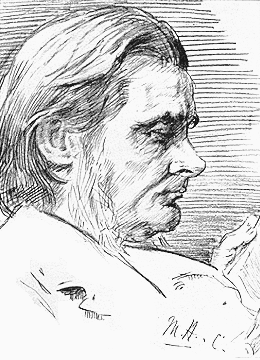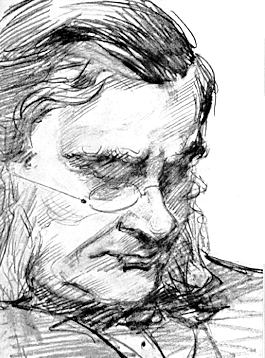

Rachel's Father
Sketches of her father, by Rachel HuxleyHuxley Archives
Strong natural talent for mechanism, music and art in general, but all wasted and uncultivated. Believe I am reckoned a good chairman of a meeting. I always find that I acquire influence, generally more than I want, in bodies of men and that administrative and other work gravitates to my hands. Impulsive and apt to rush into all sorts of undertakings without counting cost or responsibility. Love my friends and hate my enemies cordially. Entire confidence in those whom I trust at all and much indifference towards the rest of the world. A profound religious tendency capable of fanaticism, but tempered by no less profound theological scepticism. No love of the marvellous as such, intense desire to know facts; no very intense love of my pursuits at present, but very strong affection for philosophical and social problems; strong constructive imagination; small foresight; no particular public spirit; disinterestedness arising from an entire want of care for the rewards and honours most men seek, vanity too big to be satisfied by them.
4 Marlborough Place
My dear Tyndall–I cannot let this day go by without wishing you a happy New Year and lamenting your absence from our customary dinner. But Hirst and Spencer and Michael Foster are coming, and they shall drink your health in champagne while I do the like in cold water, making up by the strength of my good wishes for the weakness of the beverage.
You see I write from the new house. Getting into it was an awful job, made worse than needful by the infamous weather we have had for weeks and months, and by the stupid delays of the workmen whom we had fairly to shove out at last as we came in. We are settling down by degrees, and shall be very comfortable by and by, though I do not suppose that we shall be able to use the drawing-room for two or three months to come. I am very glad to have made the change, but there is a drawback to everything in "this here wale," as Mrs. Gamp says and my present thorn in the flesh is a neighbour, who says I have injured him by certain operations in my garden, and is trying to get something out of me by Chancery proceedings. Fancy finding myself a defendant in Chancery!
It is particularly hard on me, as I have been especially careful to have nothing done without Burton's sanction and assurance that I was quite safe in law; and I would have given up anything than have got into bother of this kind. But "sich is life."
You seem to have been making a Royal Progress in Yankee-land. We have been uncommonly tickled with some of the reports of your lectures which reached us, especially with that which spoke of your having "a strong English accent."
The loss of your assistant seems to have been the only deduction to be made from your success. I am afraid you must have felt it much in all ways.
"My Lord" received your telegram only after the business of "securing Hirst" was done. That is one of the bright spots in a bad year for me. Goschen consulted Spottiswood and me independently about the headship of the new Naval College, and was naturally considerably surprised by the fact that we coincided in recommending Hirst. . . . The upshot was that Goschen asked me to communicate with Hirst and see if he would be disposed to accept the offer. So I did, and found to my great satisfaction that Hirst took to the notion very kindly. I am sure he is the very best man for the post to be met with in the three kingdoms, having that rare combination of qualities by which he gets on with all manner of men, and singularly attracts young fellows. He will not only do his duty, but be beloved for doing it, which is what few people can compass.
I have little news to give you. The tail of the X.-Hooker storm is drifting over the scientific sky in the shape of fresh attacks by Owen on Hooker. Hooker answered the last angelically, and I hope they are at an end.
The wife has just come in and sends her love (but is careful to add "second-best"). The chicks grow visibly and audibly, and Jess looks quite a woman. All are well except myself, and I am getting better from a fresh breakdown of dyspepsia. I find that if I am to exists at all it must be on strictly ascetic principles, so there is hope of my dying in the odour of sanctity yet. If you recollect, Lancelot did not know that he should "die a holy man" till rather late in life. I have forgotten to tell you about the Rectorship of Aberdeen. I refused to stand at first, on the score of health, and only consented on condition that I should not be called upon to do any public work until after the long vacation. It was a very hard fight, and although I had an absolute majority of over fifty, the mode of election is such that one vote, in one of the four nations, would have turned the scale by giving my opponent the majority in that nation. We should then have been ties, and as the chancellor, who has under such circumstances a casting vote, would have (I believe) given it against me, I should have been beaten.
As it is the fact of anyone, who stinketh in the nostrils of orthodoxy, beating a Scotch peer at his own gates in the most orthodox of Scotch cities, is a curious sign of the times. The reason why they made such a tremendous fight for me, is I believe, that I may carry on the reforms commenced by Grant Duff, my predecessor. Unlike other Lord Rectors, he of Aberdeen is a power and can practically govern the action of the University during his tenure of office.
I saw Pollock yesterday, and he says that they want you back again. Curiously the same desire is epidemically prevalent among your friends, not least here.–Ever yours, T. H.Huxley.


Baden
[To Henrietta]
I have been having a great deal of talk with myself about my future career too, and I have often thought over what you say in the letter you wrote to the Puy. I don't quite understand what –– meant about the disputed reputation, unless it is a reputation for getting into disputes. But to say truth I am not greatly concerned about any reputation except that of being entirely honest and straightforward, and that reputation I think and hope I have.
For the rest . . . the part I have to play is not to found a new school of thought or to reconcile the antagonisms of the old schools. We are in the midst of a gigantic movement greater than that which preceded and produced the Reformation, and really only the continuation of that movement. But there is nothing new in the ideas which lie at the bottom of the movement, nor is any reconcilement possible between free thought and traditional authority. One or other will have to succumb after a struggle of unknown duration, which will have as side issues vast political and social troubles. I have no more doubt that free thought will win in the long run than I have that I sit here writing to you, or that this free thought will organise itself into a coherent system, embracing human life and the world as one harmonious whole. But this organisation will be the work of generations of men, and those who further it most will be those who teach men to rest in no lie, and to rest in no verbal delusions. I may be able to help a little in this direction–perhaps I may have helped already. For the present, however, I am disposed to draw myself back entirely into my own branch of physical science. There is enough and to spare for me to do in that line, and, for years to come, I do not mean to be tempted out of it.
|
THE
HUXLEY
FILE

|
| ||||||||||||||||||||||||||||||||||||||||||||||||||||||